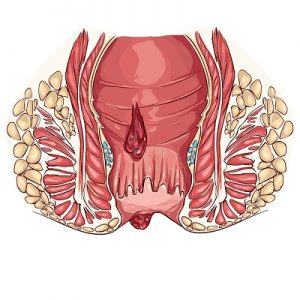 There are two types of hemorrhoids – external and internal. An external hemorrhoid is the inflammation of the soft tissue on the outside of the anus, whereas an internal hemorrhoid is the inflammation of the anal tissue that resides within the in the rectum.
There are two types of hemorrhoids – external and internal. An external hemorrhoid is the inflammation of the soft tissue on the outside of the anus, whereas an internal hemorrhoid is the inflammation of the anal tissue that resides within the in the rectum.
External hemorrhoids are easier to diagnose and treat than internal hemorrhoids. Since they are located on the exterior of the anus, the bumps caused by blood filling the tissue can be felt and seen.
The bumps, known as piles, are usually raw, sore, and itchy. Bright red blood may be found on the toilet paper following a bowel movement. Pain when sitting is common with external hemorrhoids and getting rid of them for good can feel like a nightmare.
External hemorrhoids are more likely to respond to home-care remedies such as over-the-counter products (creams, pads, etc.), sitz baths, and good personal hygiene practices. These remedies alleviate the discomfort and the hemorrhoids usually disappear entirely within a few weeks.
Many cases of internal hemorrhoids are not painful and are not noticed until blood appears in the stools or streaked on toilet paper following a bowel movement. Internal hemorrhoids can also cause a non-painful, persistent urge to move the bowels, even when there is no necessity to do so.
However, large internal hemorrhoids can be very painful, especially during a bowel movement, and cannot be treated with creams, ointments, and pads because of their internal location.
Very large internal hemorrhoids that swell and protrude through the anal opening are said to be prolapsed hemorrhoids. Prolapsed hemorrhoids can be painful and are often accompanied by heavy blood and mucous discharge. Mucous that seeps from the hemorrhoid causes severe itching and irritation of the anus and surrounding area.
Prolapsed hemorrhoids, if they are not too swollen, can be gently pushed back into the rectum to reduce pain and discomfort when wiping or sitting. Prompt medical attention should be sought if you think you may have a prolapsed hemorrhoid.
A prolapsed hemorrhoid that is too swollen to push back into the rectum may become strangulated. Strangulated hemorrhoids also occur when a clot has formed in its blood supply.
That is, the blood supply to the hemorrhoid has been cut off, resulting in excruciating pain. Strangulated hemorrhoids require emergency medical attention. If you’re unsure whether you have internal hemorrhoids or external hemorrhoids, it’s always best to consult your physician.






